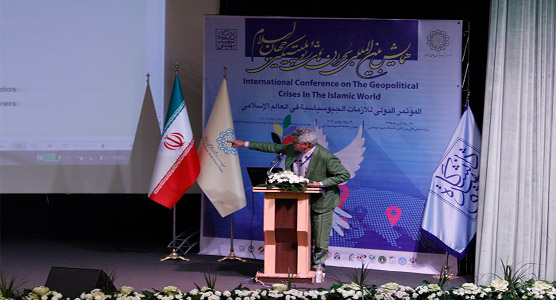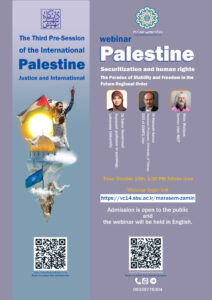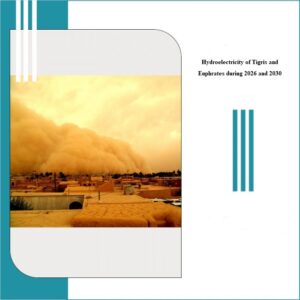Geopolitical crises in Near and Middle East
Professor Michel Foucher
International Conference on the geopolitical crises in the Islamic world
۱۴&15 November 2016, Teheran
Institute for Islamic World Futures Studies
Yesterday 14 of November, the French people paid great respect to the memory of victims of terrorist attacks which were organized from a center of gravity named Raqqa in eastern Syria and perpetuated by terrorists able to mix within the massive flow of refugees coming from Syria, Aleppo and Damascus, Turkish refugees come through the Balkan roots to Germany, Belgium and France. Suddenly the middle east crisis became also a European issue, as well as a regional one. This is very important to keep that in mind from the start. And now we have to live with this permanent threat since we know that other cells will leave in Mosul and Raqqa to plan new attacks in Europe. Are they inspired by religion? I’m not specialist but in my view, no, no, not at all. They speak Muslim; they are not religious. There is a concept in Arabic “Khawarij”, out of religion. It’s a sect which has to be destroyed. So it’s time as it was put this morning eloquently by your foreign minister, it’s time to reduce tension. It’s not only a middle east issue. It’s also a European affair and we should work more together on that. Military means are required in Raqqa and Mosul but anywhere else we need political discussion. We need diplomacy. I think this is the topic of this conference and I’m very pleased to be here once again in that place to discuss with our Iranian colleagues. I think your initiative; this first conference must be welcomed. And as professor Hafeznia put it clearly this morning, the key word is realism, realism, facts on the ground. Why? Because it’s a very very complex situation, I don’t present a global and accurate picture of the situation, just some insight on a crisis which is multiple interlocked and playing at different scales from local issues to the international ones. The past of course is useful to try and understand better what is happening. This year is 2016 so a lot of noise was made about Sykes Picot agreement, supposedly the factor of every problem in the region. When it come at Sykes Picot agreement, they are not about borders but influence which is a different story, only 5 percent of the borders were drawn by Sykes Picot and if I remember well western Iranian borders are very very old borders; Zuhab treaty in 17 century, nothing to do with Sykes Picot. But after Sykes Picot, after the end of the Ottoman Empire, a political crisis ought to organize societies. 2 options, nation- states, millet. I think there is a crisis millet are coming back, because it’s a tracks of security locally speaking, self-defense between close people, clans. Nation- state came mostly in Middle East except Iran by the means of very authoritarian regimes. One party states, military regime;
Western factors of course since the Quincy pact. Coming back from Yalta meeting with Stalin, Roosevelt took a boat, a cruise aider in Port Said to discuss with the king of Saudi Arabia, a pact security against oil. In my point of view, this pact is not valid any more, we are entering in a transitional period.
۱۹۷۸; Iranian Revolution. The end of humiliation for Shia people; but also aggression against Mecca, the great mosque in the same year by Islamist people. Soviet expedition in Afghanistan. We are still paying the bill for that indirectly. And the religious factor, which more visibility specially with Shia awakening, a Renaissance.
۲۰۰۳; completely disastrous U.S military expedition in Iraq; as you may know, France with president Chirac rightly refused to join this stupid thing and senator Obama was against it, not Hillary Clinton. But it’s complex because it was an opportunity for your country to, let say, be more active in Iraq to make sure that Iraq will never be a threat anymore and I’m not referring to Karbala and Najaf of course which are important, very important places for Iran and Shia communities. But the way Iraq was destroyed, destruction of the army of Baath party is one of the factors explaining the military and intelligence capacity of Daesh today. So we are still paying the bill. You know in history you always have bills to pay, even decades after. Critical regional context;
۲۰۱۱; Arab Revolution; so- called Arab Revolution. A mess everywhere except in Tunisia and with monarchies more able to manage, you know with money or constitutional reform. Arab nationalism is dead. There is no more Al- vatan Al- arabi. Everything took place within national framework with variety of answers, but religious factor took more space in the public space. Look at the attempts of Muslim brotherhood in Egypt, and contestation between Islamiun and official Islam, Al-azhar for example. I think the variety of these situations will be presented this afternoon.
But to conclude on that, this systemic crisis is not religious, they are basically geopolitics and so it’s important to look now at the international context because it’s a very changing context, not only because of the president elect in Washington. First Russia; Russia is back first as a regional power because view from Moscow, you can look at the map maybe, you know it’s closed by, it’s a kind of near abroad from Ukraine to the Caspian Sea. View from Moscow, it’s a scene strategic theater, Black Sea, Eastern Mediterranean, and the Caspian Sea with the Chechen problem, northern Caucasus is in permanent mess. So Russia is back and will stay, so problem with Russia is that they tend to see, not Russia but the Kremlin. They tend to interpret popular uprising, democratic demand for more justice, dignity as a plot inspired by west, in the west, Europe and the U.S.
But at the same time, Russia is trying to capitalize from its new regional position to get parity with the new president in Washington. This was put very clearly in the first message from president Putin to president elect. Parity like easy very all good time of the cold war. You have some nostalgia there. I think it’s a bit illusory.
United States; I know that in Iran it’s always difficult to talk objectively about the United States; but if I look that let say from French diplomacy, we were very upset with president Obama because he was not interested by the crises in the region. You remember his sentence about the Syria, a very tough one, “we have no dog in this fight.” So we don’t care. Why we don’t care? Because the new foreign policy of the U.S is to concentrate on pure national security interest; the time of sending missionaries, missionism to impose democracy from the top everywhere is over. And by the way it was a big failure and Trump will accelerate this Obama doctrine, which is to concentrate on purely American national interest. This is not isolationism. I called it in a paper published today in the French press, as “Americanism”, American is first. So they are very upset in the region with that, they were upset with Obama in Israel, in Saudi Arabia, in Egypt and now they are very pleased. They are rushing everywhere; they are rushing from the region to Washington because they think that with trump it will be more beneficial. So Trump will not disagree but he will filter its policy through much narrower prisms of U.S national interest. So consequence of this shift is that a great scope will be given to the regional allies, Turkey, Egypt, Saudi Arabia to project on power and to pursue their own conflicting interests. So we will have a more reduced involvement in the region, except Israel for security in the case of Palestine, it’s a dream to think about independent Palestine. I don’t want to be provocative but you know an adviser to the president elect explains that new settlement is not an obstacle to peace process but there’s no more peace process and by the way France is the only diplomacy trying to put the issue on the table even if the Palestinian were wise enough not to participate to the Arab Revolution.
For Europe one map all our environment is very critical. If you look at the list of international crisis group which is a very objective one, you have more or less 75 crises civil or wars in the world; 83 percent of the 75 are located between a range of 3 to 6 hours of flight from Paris, or Brussels or Berlin. So we don’t have a peaceful environment, so we can’t sleep, we can’t be indifferent; we have to deal with that crisis inside in Libya, we were part of the crisis by the way, and in the Middle East because it’s also next go. We ought to get out of that mess. First I’m talking as a former diplomat, if I may professor Hafeznia because it’s an applied geopolitics not academic. Don’t let Washington and Moscow make a deal. A deal is a key word of the president elect. It’s too late. History is the regional power. I have no time to talk about infra-national system, but Iraq, the French view is that, a confederal Iraq should be nice. Confederal Iraq with distribution of resources, decentralized Syria with autonomy. It’s a dream maybe. But my point is regional scale because you have a situation where your country after 2003 became the first non-Arab regional power on the Arab world. It’s a fact and when you are in Riyadh you don’t like that. The minister talked this morning we have to understand each other, of course this is a clear fact. So I think the key actors are your country and your neighbor on the other side of the Persian Gulf.
It’s a French official map from French diplomacy, in Persian Gulf. I hope you appreciate that. Turkey was dreaming of becoming the leader of you know the Sunni- led government of the Arab Revolution. Now It’s a new Ottoman dream. Now Turkey seem to be much more preoccupied by, you know, Kurdish issue north of Mosul and north of Syria. But I don’t see a very positive role at regional level for Turkey today, as a main actor. If I mention my own view, I think a kind of deal, an agreement in terms of areas of influence should be studied, tested, discussed in small format, secret talks, -secret diplomacy is very important, – formal, informal talks, but of course with agreement from the top.
I am so sorry to be provocative; to have a kind of new modern Yalta style agreement based on facts. Your country has more interest in some regions than others for example Saudi Arabia in Yemen. Yemen is not vital for your country; Lebanon is more important for your country. I am very close to real politics. So this is the way I see the things, 3 points to keep in mind to conclude. First definitely we are facing geopolitics even if many Shia victims were killed by Daesh. It’s about geopolitics not religion, so it’s about strategist, diplomats, geopoliticans. But you need to be two to make a deal. If I remember well, the president of commission of foreign affairs of your parliament told us in international diplomatic academy in Paris 2 weeks ago that there was a Persian proverb “you need two hands to applaud.” Why? Iran is one hand.
And last point, if may I quote it, imagination is important, not everything is based on geopolitics. Confidence could be based on private relation, culture and I understand there is a display of Arab and Persian works in Tehran museum of contemporary art as an effort to ease regional tension. I am referring to a peace, lands of solidities and abstract paintings of a veiled Arab woman drawn by a Saudi artist today in Tehran. Iran’s art shows bridges to Middle East divide.
Former ambassador Sadegh Kharazi, former ambassador in France by the way is right to think that –I saw that in the newspaper yesterday in the plane – is right to think that culture can also be a tool for diplomacy.





